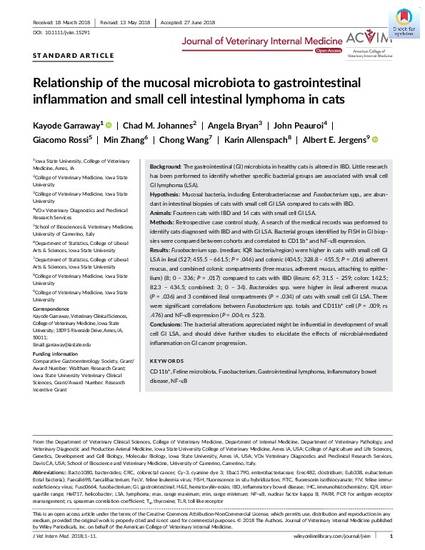
Background: The gastrointestinal (GI) microbiota in healthy cats is altered in IBD. Little research has been performed to identify whether specific bacterial groups are associated with small cell GI lymphoma (LSA).
Hypothesis: Mucosal bacteria, including Enterobacteriaceae and Fusobacterium spp., are abundant in intestinal biopsies of cats with small cell GI LSA compared to cats with IBD.
Animals: Fourteen cats with IBD and 14 cats with small cell GI LSA.
Methods: Retrospective case control study. A search of the medical records was performed to identify cats diagnosed with IBD and with GI LSA. Bacterial groups identified by FISH in GI biopsies were compared between cohorts and correlated to CD11b+ and NF‐κB expression.
Results: Fusobacterium spp. (median; IQR bacteria/region) were higher in cats with small cell GI LSA in ileal (527; 455.5 – 661.5; P = .046) and colonic (404.5; 328.8 – 455.5; P = .016) adherent mucus, and combined colonic compartments (free mucus, adherent mucus, attaching to epithelium) (8; 0 – 336; P = .017) compared to cats with IBD (ileum: 67; 31.5 – 259; colon: 142.5; 82.3 – 434.5; combined: 3; 0 – 34). Bacteroides spp. were higher in ileal adherent mucus (P = .036) and 3 combined ileal compartments (P = .034) of cats with small cell GI LSA. There were significant correlations between Fusobacterium spp. totals and CD11b+ cell (P = .009; rs .476) and NF‐κB expression (P = .004; rs .523).
Conclusions: The bacterial alterations appreciated might be influential in development of small cell GI LSA, and should drive further studies to elucidate the effects of microbial‐mediated inflammation on GI cancer progression.
Available at: http://works.bepress.com/chong-wang/99/

This article is published as Garraway, Kayode, Chad M. Johannes, Angela Bryan, John Peauroi, Giacomo Rossi, Min Zhang, Chong Wang, Karin Allenspach, and Albert E. Jergens. "Relationship of the mucosal microbiota to gastrointestinal inflammation and small cell intestinal lymphoma in cats." Journal of Veterinary Internal Medicine (2018). DOI: 10.1111/jvim.15291. Posted with permission.